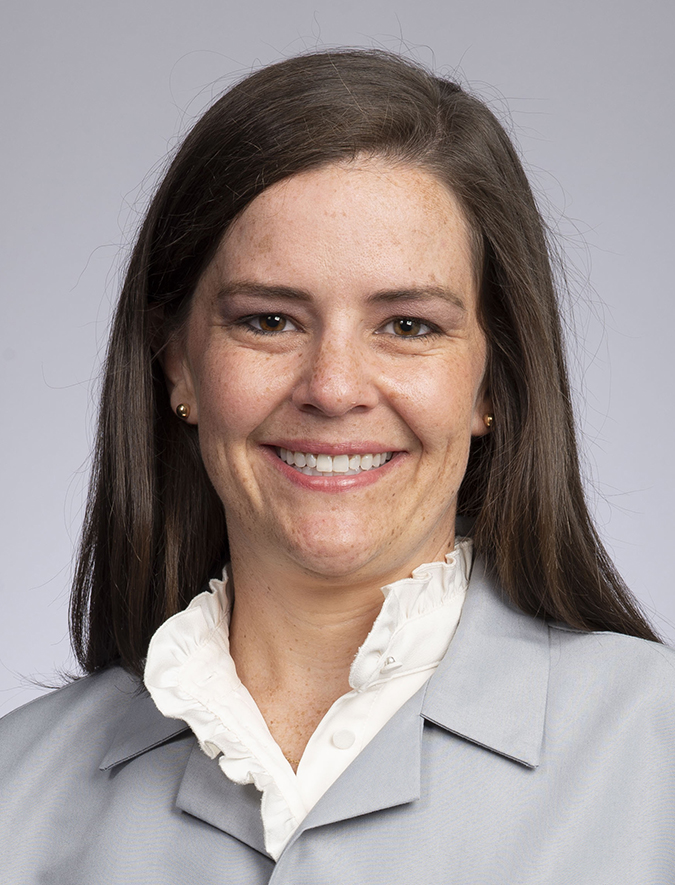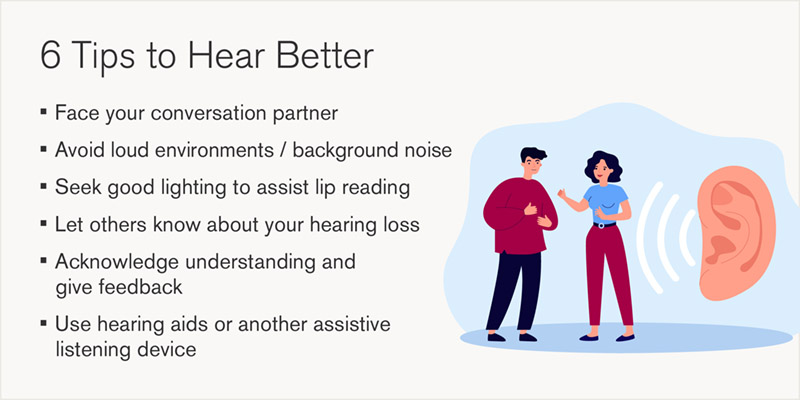Navigating Life with Hearing Loss: Practical Tips and Advanced Solutions
April 22, 2024
Categories: Health & Wellness, ENT/Otolaryngology
Tags: hearing loss
Hearing loss is a common condition. Approximately 15% of American adults ages 18 and over have reported trouble hearing. Peak hearing loss occurs in adults between the ages of 60 and 69. While there is currently no reliable method of reversing hearing loss, there are ways to make sure that it doesn't get worse.

We spoke with Sarah Finucane, MD, an otolaryngologist at Loyola Medicine, to learn how patients can stop future hearing loss and make the most of their current hearing potential.
"Hearing loss is essentially a diminished capacity to perceive sounds or comprehend speech. It may manifest temporarily due to conditions like infections, or it can be a permanent change resulting from congenital factors or progressive deterioration. The complexity of hearing loss lies in its dual nature; it can be both temporary and permanent, and it may worsen over time," says Dr. Finucane.

Everyday tips to maximize hearing potential
If you're suffering from hearing loss, it can be a difficult adjustment. However, there are simple daily things you can do to maximize your current hearing ability.
Focus on visual cues
A conversation is not just about the words being spoken. Visual cues are also an intrinsic part of communication, used to convey meaning and information. Body language, facial expressions, and gestures help the listener understand the meaning of a conversation.
Choose the best listening location
Your environment can have an impact on how well you can hear. If possible, choose a location that has physical characteristics that make it easier to listen. For example, choose restaurants with good lighting to see the person's lips more easily or meet in a room with carpet to reduce echo.
If you find yourself in a location poorly suited for hearing, practice adjusting to your situation. Sit across from your host in a restaurant, place yourself between the speaker and background noise, or move to a room away from music at a party.
Explain your hearing loss
Living with hearing loss doesn't have to rest only on your shoulders. The person you're speaking to can also help you understand them better. Don't be afraid to explain your hearing loss to others so they can make adjustments by, for example, giving you a clear view of their face.
"Individuals experiencing hearing loss should not hesitate to advocate for their needs. Requesting speakers to talk slower or louder can make a significant difference in understanding. It's important for people with hearing loss to actively seek accommodations that improve their ability to engage in conversations, thereby enhancing their social interactions and overall well-being. If you find you are consistently having to utilize these strategies to communicate, you should see your doctor to get a hearing test. You may be a candidate for hearing aids," says Dr. Finucane.
Protective strategies to prevent further hearing damage
In some cases, hearing loss is temporary. Unfortunately, it can also be permanent, especially if repeated loud noise causes damage to hair cells, membranes, nerves or other parts of your ear. If you're experiencing hearing loss, it's critical to implement protective strategies to prevent further damage.
- Limit loud sounds. For most people, it's impossible to avoid all loud noises. However, noise-induced hearing loss is a direct result of repeated exposure to loud sounds. Specifically, 85 dBA or above can cause hearing loss. Sirens, movie theaters, motorcycles and fireworks all fall at, or above, this level.
- Wear ear protection. While limiting your exposure to sounds is important, sometimes the most memorable events in life are loud. If you know you're going to be around louds sounds, like a concert or amusement park, wear ear protection. Earplugs and earmuffs can reduce noise by 15 to 30 decibels. Many modern Bluetooth earbuds have a setting that reduces loud sounds.
- Talk to your doctor. Frequent visits to your local audiologist – a hearing specialist – can help prevent further hearing damage. Make an appointment to get a hearing test if you have close relatives with hearing loss, have frequent trouble hearing conversations, often hear ringing, or are frequently around loud noises.
"The progression of hearing loss can often be lessened through proactive protective measures, particularly by minimizing exposure to loud noises. It is within our control to safeguard our ears, and such practices should be adopted universally to preserve hearing capabilities," says Dr. Finucane.
Consider hearing devices to assist your life
Depending on the severity of your current loss, your doctor may recommend a hearing device to make the most of the hearing you do have. There are many options for all levels of severity that can improve the lives of many patients.
“Patients often ask, ‘When should I get a hearing aid?’ I usually tell patients that they should consider a hearing aid when their hearing loss starts to affect their quality of life. If they notice they are avoiding activities or social engagements. I encourage them to not wait until they are no longer doing the things they love,” says Dr. Finucane
Hearing aids
If worn consistently, hearing aids can significantly help, including your psychological and cognitive health. Patients with hearing loss have an increased risk of anxiety, depression, and dementia, yet only 16% of people ages 20 to 64 actually use hearing aids.
Hearing aids work by amplifying the sound around you and can be adjusted to suit your specific needs. There are over-the-counter (OTC) hearing aids for adults 18 years of age or older with mild to moderate hearing loss. They should not be given to children or adults with severe loss.
Assistive listening devices
These devices help patients to hear sounds in specific activities and situations. In general, there are five categories of assistive listening devices.
- Audio induction or hearing loop. These transmit sound that encircles the listening area. They can be used in small spaces to improve one-on-one communication by increasing the volume of a conversation or decreasing background noise.
- FM system. Sends sound wirelessly via radio waves to a patient's headphone or other accessories. These are commonly used in group spaces, such as church, conferences, or classes.
- Infrared system. Transmits sound via invisible light beams. Similar to FM systems, infrared systems are used for group settings, although the receiver must be in direct line of sight with the transmitter.
- Personal amplified system. A portable device that transmits sounds via a microphone to a listening device. This is useful for personal conversations or TV listening.
- Bluetooth system. Sends sounds via Wi-Fi and works directly with devices that have Bluetooth, including hearing aids.
Cochlear implant
For those with severe hearing loss, cochlear implants can be helpful. It's a small electronic device that sends an auditory signal directly to auditory nerves. Know that cochlear implants can't bring back your natural hearing and they require surgery. Instead, they give patients a representation of sounds in their environment. They also require significant therapy to learn or relearn their sense or hearing, but in the right patient, can be life-changing.
"In cases where traditional hearing aids no longer provide the necessary benefit, cochlear implants may be considered. These are advanced surgical solutions designed to stimulate the inner ear directly with an electrode array. They represent a significant leap forward for individuals with profound hearing loss, offering an opportunity to engage with the auditory world anew," says Dr. Finucane.
Support networks for hearing loss
If you are living with hearing loss, it's important to realize you are not alone. Building a support network is crucial for emotional help, practical advice, and sharing experiences. Engaging with others facing similar challenges can profoundly impact mental health and quality of life. You can ask questions from people who are going through similar circumstances as you. Support groups are wonderful for coping with your hearing loss and receiving mutual support.
There are national support groups for people with hearing loss. Both the Hearing Loss Association of America and Association of Late-Deafened Adults have local chapters.
Sarah Elizabeth Finucane, MD, is an experienced otolaryngologist at Loyola Medicine. She treats patients with conditions of the ear, nose and throat. Her extensive knowledge of non-operative and operative treatment of hearing loss and other ENT conditions is reflected in her patient-centered approach to healing.
Book an appointment today to see Dr. Finucane by self-scheduling an in-person or virtual appointment using myLoyola.
